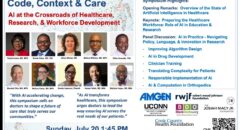
Whether we like it or not, systemic health disparities are a thing.
Marginalized communities, forgotten projects, and low-income areas simply do not have the access that other places take for granted. While legal frameworks and grassroots efforts help, there is still a lot of work to be done.
Enter: AI
Thanks to recent advances in artificial intelligence (AI), opportunities previously thought impossible are now everywhere, every day. Not just for work, education, and fun, AI systems are now revolutionizing the healthcare space.
But don’t worry. If AI sounds intimidating or you don’t know where to start, we’ve got you covered.
Let’s break down five game-changing innovations you can start using right away…
1. Diagnostic Chatbots
It may sound a little strange, but imagine having a doctor right in your pocket, available 24/7 to answer any question you have. Known as diagnostic chatbots—like AI-powered apps or websites—these smart tools can help figure out exactly what’s on your mind.
The process is simple. You type in your symptoms, like a cough or fatigue, and the chatbot asks follow-up questions to suggest possible conditions or next steps. Chatbots like Ada Health can correctly identify conditions 85 percent of the time, which is comparable to human diagnoses.
If you’re facing long wait times for appointments, definitely consider chatbots. Although they’re certainly not a replacement for doctors, they are a great starting point to get the ball rolling. Many of the apps are free and smartphone compatible, making them great for checking from home.
Just make sure to always double-check serious concerns with a doctor.
2. Precision Medicine
‘Precision medicine’ is a term for individualized healthcare that precisely targets your unique traits. These include everything from genes to lifestyle, culture, and even your zip code. The reason this is so useful is that AI makes it easy. AI can quickly analyze massive amounts of data to match treatments perfect for you.
In one critical study from Nature Medicine, precision medicine improved outcomes by 40 percent for Black patients with breast cancer. Of course, this precision medicine isn’t just for cancer or terminal disease. It can also be used for conditions like diabetes, hypertension, and even obesity. Thanks to AI, genetic testing can be used to identify specific drugs and treatment protocols for specific patients.
Ask your doctor if these options are available. Clinics like the Mayo Clinic, as well as community health centers, offer many of these services. Some are even covered by insurance or Medicaid!

3. Enhanced Early Detection
Early detection can make a world of difference. It means finding health issues before they become serious, and AI is leading that effort. In 2025, AI tools can analyze medical images, blood tests, and other specimens and diagnostics. AI can even analyze wearable device data to spot warning signs of diseases like cancer or heart disease.
Amazingly, AI can detect lung cancer in chest X-rays with 90 percent accuracy, an improvement over traditional methods. Given that Black people face higher mortality from lung cancer, this is a critical application.
If you have a Fitbit or smartwatch, you probably already know what AI can do. Whether it’s tracking heart rate or monitoring sleep patterns, the data is all there.
4. AI-Driven Drug Discovery
It used to take many years to develop certain drugs. Now, AI can compound that workload like never before. Thanks to this new form of ‘intelligence,’ finding the compounds that work best for certain diseases has never been easier.
For instance, studies indicate that AI-designed drugs for diabetes reduce development time by 50 percent. That means new insulin therapies that better manage blood sugar. It means fewer harmful health effects. It means better outcomes, short-term and long-term.
Beyond that, AI can also help repurpose existing drugs for new uses. Many drugs out there may have undiscovered or underutilized applications. With the power of artificial intelligence, these medications can go a long way in addressing long-standing medical issues.
Websites like ClinicalTrials.gov list trials open to Black patients, sometimes with free access to the latest treatments.

5. Automated Clinical Documentation
Let’s face it, doctors are busy.
They’re juggling a million different balls, and sometimes, frankly, it feels like they aren’t really hearing you. Do you ever feel like your doctor is more focused on their computer than on you? Well, this is where automated clinical documentation becomes useful. With the integration of AI, note-taking is streamlined. Now doctors can focus on listening and observing, rather than staring at a screen!
Tools like Nuance’s Dragon Medical One can even transcribe conversations in real-time, reducing all that time-consuming administrative work. Impressively, AI documentation can cut doctors’ paperwork time by as much as 40 percent, a major deal for a busy patient schedule.
But it doesn’t end there. These tools also reduce errors in medical records, ensuring your health history is actually accurate (pretty important!).
So take the plunge and see what’s available. Ask your doctor if they use AI tools like Dragon Medical or Suki, and don’t hesitate to seek practices that do. If you’re worried about what’s being documented, you can always request a copy of your visit notes to ensure accuracy.
Because many Black communities face systemic health challenges, it’s always critical that you stay on your toes. Higher rates of chronic diseases, shorter life expectancy, and less access to quality care are nothing to sneeze at. Compared to other races, Black Americans are also 30 percent less likely to receive timely specialist care. That may not sound like a lot, but when it comes to serious conditions, it’s literally a matter of life and death.
So allow technology to improve your life! The capabilities of AI are increasing all the time, so if you find yourself overwhelmed, look into beginner guides. There are plenty all over the internet, and companies like Microsoft and Google offer their own crash courses.
What matters is that you make an effort to grasp the basics. You don’t need to be an expert in AI to take advantage of healthcare innovations. You simply need to know what kind of things are out there. With a little knowledge, you can enjoy high-quality diagnostics, treatments, and accessible care.
Although AI is surely no replacement for good ol’ fashioned humans, it’s a great complement. When it’s all said and done, these tools aren’t just tech—they’re a path to health equity. By embracing them, you are in the driver’s seat. You get to control your wellness, overcome your barriers, and build for a healthier tomorrow like never before.








